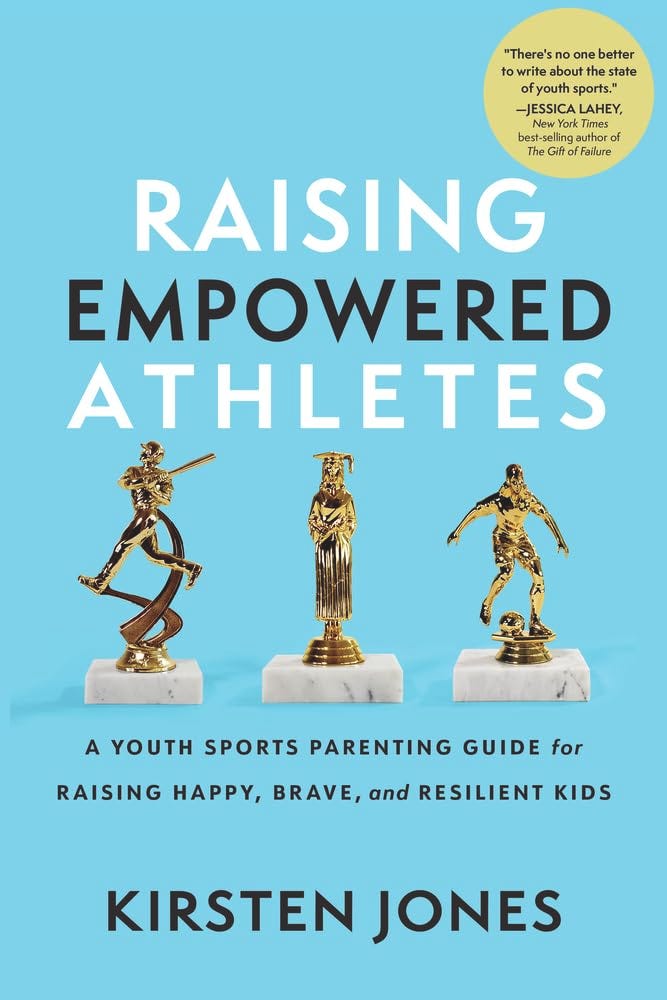Are You Helping or Hurting Your Child?
This is the central question behind our first Good Game Book Club book: 'Raising Empowered Athletes: A Youth Sports Parenting Guide for Raising Happy, Brave, and Resilient Kids.'
Happy holidays! Hopefully the hustle and bustle of your youth sports calendar is starting to simmer for a few weeks. I love having a sliver of time where the decision-making shifts from who is taking what kid to what tournament to whether we’re seeing Godzilla or Wonka. Or better yet, whether we should just dump the kids at the movies and get a nearby cocktail instead. Seriously, this is amazing way to squeeze in a quick date night if your kids are old enough and have a charged device.
It so happens that many movie theaters have nearby book stores so maybe after that delicious espresso martini or IPA, you saunter into one. Perhaps you are magnetically pulled toward the parenting or sports titles but you intentionally look away since this is “you” time. However, when you are ready to dive back into reality, there are a plethora of fantastic books relevant that are both entertaining reads and align with our mission here at Good Game, which is to arm you with perspectives, trends, and resources so you can make the most educated decision for your kids.
Introducing the Good Game Book Club where I will be chatting with authors of insightful books curated by me (and you!) and diving deep into their themes and key takeaways. To kick us off, I’m thrilled to present a Raising Empowered Athletes: A Youth Sports Parenting Guide for Raising Happy, Brave, and Resilient Kids by Kirsten Jones. Jones’s word of wisdom, both in reading her words and later in conversation, drummed up all kinds of emotions and endless takeaways.
One of the numerous cautionary tales that particularly struck me in Raising Empowered Athletes was that of a young golfer in Southern California. His well-meaning dad wanted to figure out his son’s passion and one day took his son to the driving range for a low-key golfing experience. Turns out a pro noticed the kid’s exceptional swing and encouraged father and son to sign up for lessons. Dad was happy. Son was happy. Who doesn’t want to be recognized for natural talent?
The kid soared. He traveled on the competitive Junior California Tour. For the next decade-plus, the family dragged their other four kids with them all around California and United States prepping what they hoped was the next PGA Tour star.
All those reps and natural talent paid off. At age 15, the family won the lottery. Stanford came calling and offered him a full-ride scholarship. From afar, the parents did their job. They helped their kid find his passion early. They invested endless time and money to help him achieve what they assumed were his dreams Yet at 18 when he was ready to pack his bags for Palo Alto, he sat down his mom and dad and finally had the courage to share his truth.. I’m not going to Stanford and I’m never playing golf again.
The author of Raising Empowered Athletes, Kirsten Jones, points out that the kid had essentially operated like a pro athlete for 12 years. He was burned out.
“He didn’t have any time off,” Jones, a former D1 athlete, parent to high-level athletes, former Nike executive and current peak performance coach, says. “The American Board of Pediatrics recommends that you take 3 months off in between every sport. Most kids are lucky if you get 48 hours, forget 3 months. We’re sucking all the wiggle room.”
The golfer’s story is both terrifying and unique but the general thought process is commonplace . Most kids don’t get full-rides to Stanford but many youth sports parents succumb to the temptation of the extremely minute possibility that they might. The one-time lesson becomes six times-a-week trainings weekly. The tourney win becomes traveling across the country trying to gain as much exposure as possible. Of course the early specialization becomes mandatory, the grind and pressure constant. The rare kid can’t get enough but most kids feel a heavy dose of unnecessary pressure, argues Jones.
In Raising Empowered Athletes, Jones explains how we got here, how modern helicopter parenting is in large part due to a confluence of events.
More women joining the workforce = more resources.
Widespread reporting in the 70’s and 80’s on American kids lagging academically behind most industrialized nations sparked the rise of the private tutor. (Which of course would later extend to private coaching in the youth sports space.)
A 1983 made-for-tv movie about the abduction and murder of 6-year-old Adam Walsh two years earlier was seen by 38 million and spooked parents into seeking out safe, organized activities for their kids as opposed to free ranging.
ESPN launched in 1979 and exposed parents to a number of elite athletes on a 24-7 basis. Maybe my kid could be the next Andre Agassi, some may have thought.
Today, TikTok and YouTube Shorts capture a wave of new youth athlete “stars” almost in real time - the two-year-old throwing a perfect spiral, the four-year-old with a perfect swing, the five-year-old performing all kinds of stunning soccer tricks. Our kids may watch and marvel - us too - without realizing that the perfect swing may have come on the 78th take, that before and after the young prodigy may have mostly fallen over, missed the ball, shit their pants and had four temper tantrums because they were losing patience with their dad’s quest to capture the “maybe this will go viral” take.
At its core, the book hopes to empower parents to empower kids. Much boils down to perspective and reality. As Jones points out, no one sets out to be that hovering parent who sucks the joy out of their kid’s childhood.
Empowered kids have agency, Jones writes and tells us. “Remember to check in early and often and just because at age 8 they declare golf is the best sport ever, it doesn't mean they’ll feel that way even at 8.5.” However, they might feel beholden to stick with golf because they see how the parent lights up.
Red flag: The kid looks at the parent right after every at bat, every swing, every missed shot. Maybe that parent is truly the kid’s “private coach” and they want immediate feedback but more times than not, they are aware of how their performance impact’s that parent’s psyche.
Jones stresses that parents need to make sure their kid is getting pleasure from playing the particular sport and know they are supported in any sport they want to try. And to ask whether their involvement is helping or hurting their child.
Empowerment stems not only comes from having a say, it comes from failure. Yes, it sucks not to make a team or to lose playing time or feel like a certain skill is unattainable. Jones says it’s crucial to look at the big picture and pass that along, “The way we learn as human beings is by trial and error,” she says. “It’s a great moment to remind them of when they couldn’t spell. Show them examples from their own lives. It’s all about growth mindset.” What kids don’t need is a parent stealing the moment by stuffing them with negative feedback. The coach is an idiot. How can he not see your potential. Blah blah. A so-called failure is an opportunity for the kid to build character and resiliency and for the parent to show empathy.
Jones stresses the importance of keeping up a child’s curiosity. It starts with exposing them to as many sports and activities as possible. When they gravitate to two or three (or even just one), it will have been child-led. Hopefully this leads to an inherent desire to take the lead on figuring out the various sports cultures, figuring out the workload needed for success, or just figuring out what level will be the most fun. These are the kids that ultimately feel ownership. The kid whose parents swoop in and make every decision are far more susceptible to bail when times get tough later on.
And finally, we have to talk about what Jones refers to as the ‘F’ world, FOMO. Just because some intense sports parent looks at you in horror because you’ve decided to keep your 6-year-old in rec basketball doesn’t mean you should immediately find the nearest AAU team. Perhaps the most important takeaway from Raising Empowered Athletes is its reminder to stop treating youth sports, especially at the younger ages, like everything is a resume builder. Elite this or club that at age 9 or even age 12, for that matter, is largely meaningless. Of course if a kid is gung ho about a program or team for the right reasons, then by all means go for it. But you don’t have to go to the best private coach in are just because your neighbor is. As Jones cautions, doling out ungodly amounts of money in hopes of landing a scholarship, can only take you so far.
“At a certain point genetics are genetics.“ she says.” I’ve heard many D1 coaches, particularly basketball coaches say, ‘if they’re in a cornfield in the middle of Kansas and they’re talented, we’ll find them.’”
Raising Empowered Athletes offers a slew of specific strategies for parents and leaves us with many difficult questions and realities to consider. The end goal being kids who are confident, not afraid to fail, curious, embrace feedback, coachable, internally motivated, and most of all, having fun.
Raising Empowered Athletes A Youth Sports Parenting Guide for Raising Happy, Brave, and Resilient Kids is available on Amazon and booksellers throughout the country. I will be sharing my full video conversation with Kirsten Jones in the coming days. I promise there are many more cautionary tales that you don’t want to miss.
Please reach out if you’ve read or eyed a book that we should consider for a future Good Game Book Club.






My friend just sent me a link to your article about pay-to-stay after I emailed him bemoaning the baseball travel ball shenanigans. I love your substack! Recently, a published a memoir about a single season of Little League baseball I spent watching my older son play with my dad. It was the season after my brother died, and the story is about the healing powers of baseball and youth sports (my brother had been an All-Star player and my husband coached that season). It's a story about family, redemption, grief, and some adults getting WAY WAY too into baseball in the mutual sideline foxhole that is youth sports. Would you consider my book for your book club? Sorry to leave this as a comment; I couldn't figure out how to message you directly. It's called "Making It Home: Life Lessons From a Season of Little League" and I believe it would be a fit for your readers. Cal Ripken Jr. said, "It's a story about a team that becomes a family, and a family that becomes a team," and it was a USA Today "must read." If you're interested, I can send you a copy! Thanks for all you do to foster conversations around youth sports! Best, Teresa Strasser!